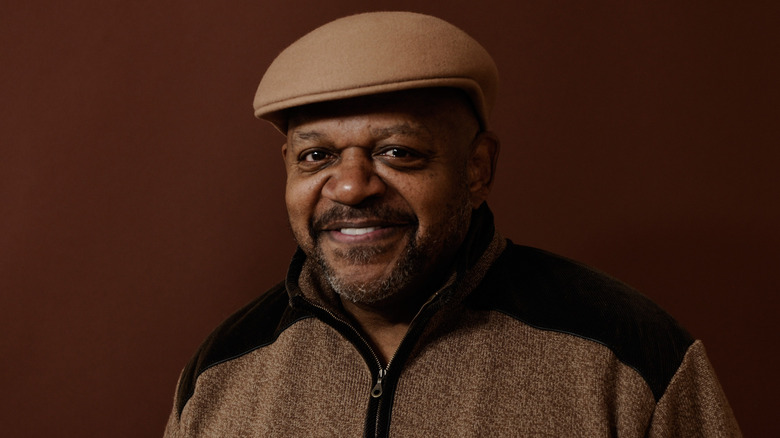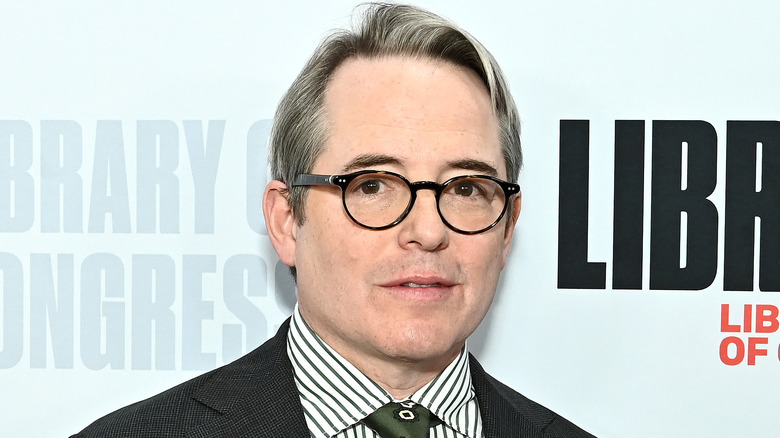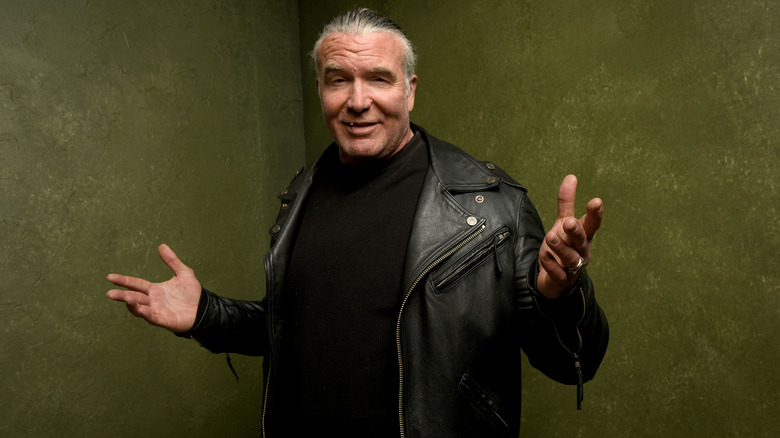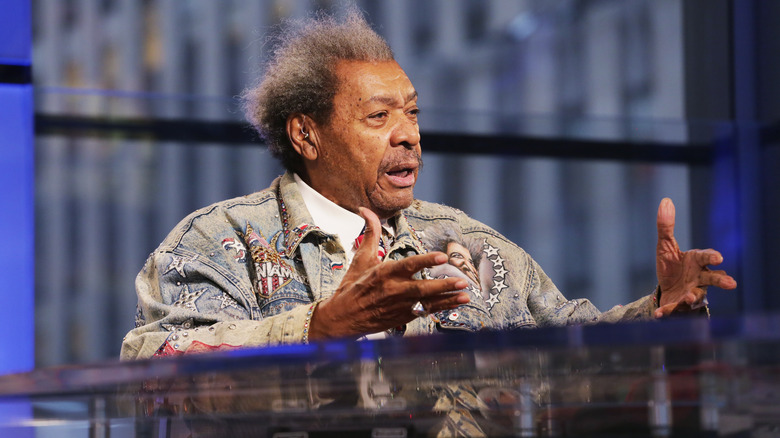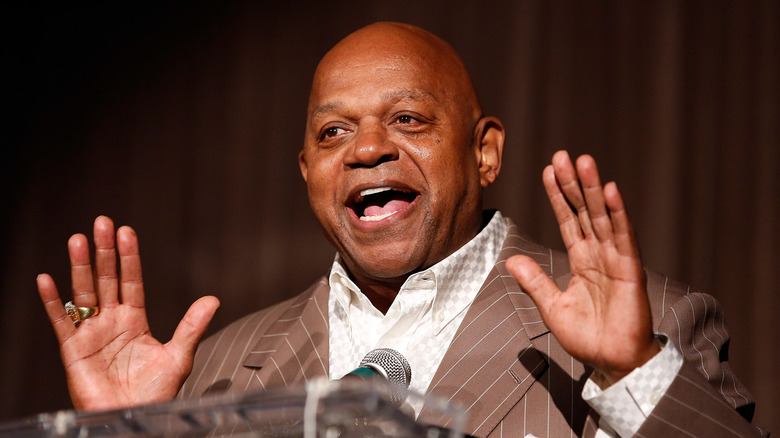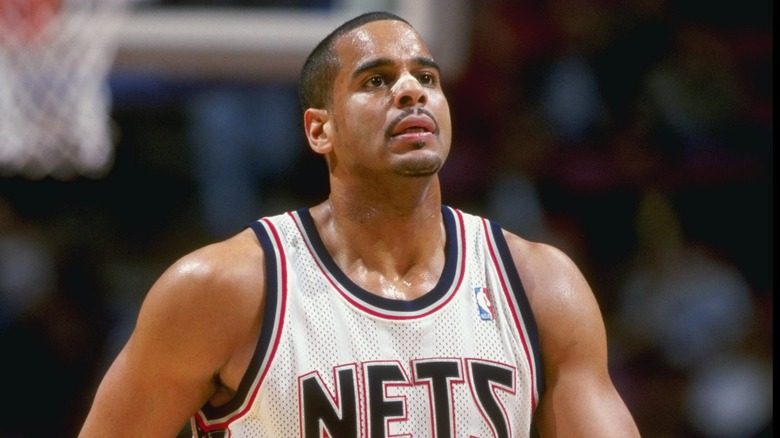Celebrities You Never Knew Had Killed People
As we all know, celebrities are often very, very different from the images they project to the public. The lovable goofball who endears themselves to millions with their oddball humor might be hiding untold sadness and melancholy; the badass action hero who dispatches the bad guys with effortless cool might be a totally awkward geek, and the terrifying villain who makes your blood run cold with a glance might be, in actuality, a really nice person. (Case in point: Danny Trejo.) Some famous people, though, are hiding something beneath their public persona that might break any of us — causing the death of another person.
In the whole of the human experience, there may be nothing so profoundly altering as taking the life of another — whether an unbearable tragedy, or the unearned guilt of having been in the wrong place at the wrong time — and all of the celebrities we'll be looking at today, whether intentionally or not, have done just that.
Matthew Broderick
In early August 1987, Matthew Broderick was still riding high on the success of the film which handed him the role that remains his signature to this day: "Ferris Bueller's Day Off," the 1986 John Hughes comedy that familiarized audiences with fourth-wall breaks, post-credit scenes, and what a finsky will do for a guy's attitude. At the time, Broderick was dating Jennifer Grey, who portrayed his sister Jeanie in the film and was about to have her own star turn in the soon-to-be-released "Dirty Dancing."
The two were vacationing in Northern Ireland, cruising along on a country road north of Belfast with Broderick at the wheel, when tragedy struck: the actor drifted into an oncoming lane, striking a vehicle being driven by 28-year-old Anne Gallagher. She and her 63-year-old mother, Margaret Doherty, the vehicle's passenger, were killed, and Broderick was hospitalized with a broken leg, among other injuries.
Broderick was slapped with a charge of death by reckless driving, and faced up to a decade in prison — but ultimately, he was convicted of the much lesser charge of careless driving, and paid a fine. Speaking with ET Online in 2022, Grey shared that she is still haunted by the incident. "It's very hard to describe when you ... are present for the death of other people," she said. " It's just something that you just don't come back from in the same way."
Scott Hall
Scott Hall, professionally known as Razor Ramon, was a beloved pro wrestler in multiple leagues; he was a four-time winner of the WWE Intercontinental title, and with partner Kevin Nash, he was a seven-time winner of the WCW tag team championship. He wrestled in over 1,500 matches throughout his 26-year career, and there was perhaps no more effective heel; his villainous persona was one for the ages, and in 2014, he was inducted into the WWE Hall of Fame. Before he became famous, though, he was involved in a tragedy that may have derailed his career.
In early 1983, Hall was bartending at an Orlando strip club when he got into an argument with a patron. The man found Hall's car in the parking lot, and started smashing out the windows — and when Hall confronted him, the man pulled a gun. Speaking with ESPN, Hall recalled that he punched the man, who produced a gun; the two struggled for the weapon, Hall came up with it, and shot the man in the head, killing him.
Although second-degree murder charges against Hall were dropped when it was determined he acted in self-defense, he would struggle with the guilt of having ended a life for years; he shared with ESPN that he "should have sought counseling," but instead began misusing alcohol. Hall was in and out of rehab, paid for by the WWE, for most of his life; he passed away after complications from hip surgery in 2022 at the age of 63.
Amy Locane
In nearly three decades as an actress, Amy Locane etched out a respectable career; she appeared on the big screen in cult classics like "Lost Angels," "Secretary," and John Waters' "Cry-Baby," and appeared in the main cast for the first season of the hit TV series "Melrose Place." In 2010, though, she made a terrible mistake that cost her not only her career, but years of freedom. In June of that year, Locane got behind the wheel while drunk — and her journey ended when her car crashed into that of 60-year-old Helene Seeman, who was pulling into her driveway when struck. Seeman was killed, and her husband was seriously injured.
Locane blamed the accident on a third motorist, who she says distracted her by chasing and honking at her, an excuse that didn't sit well with the sentencing judge at her trial. She was sentenced to three years in prison, and was released in 2015 — but in a shocking development, the prosecutor's office appealed her original sentence after her release, successfully arguing that her it was too lenient. After years of legal wrangling, she was re-sentenced in 2020 to eight more years, and she remains incarcerated today.
Brandy Norwood
Brandy Norwood, known professionally by her first name, was one of the hottest female solo acts of the '90s; between 1994 and 2002, she placed no fewer than seven top-ten singles, and reached the top of the chart twice with "Have You Ever?" and "The Boy is Mine," both from 1998. Norwood has also had success as an actress, notably starring in the long-running sitcom "Moesha," and she has continued to make music and occasionally appear in movies and television shows to the present day. In 2007, though, her career was nearly derailed by a terrifying crash on a California freeway.
Norwood, piloting a Land Rover, rear-ended a much smaller Honda while doing roughly 65 miles per hour; that car, being driven by 38-year-old Awatef Aboudihaj, struck another vehicle, smashed into a divider, and was finally struck by an oncoming vehicle. Aboudihaj later died at the hospital from injuries sustained in the crash, and a witness would later tell TMZ that in the wake of the accident, a distraught Norwood was wandering around in traffic, loudly blaming herself for the tragedy. Police investigators indeed recommended that the star be charged with vehicular manslaughter — but after conducting their own investigation, prosecutors found that there was insufficient evidence to merit any charges.
Rebecca Gayheart
In the early '90s, up-and-coming actress Rebecca Gayheart landed a gig that near-immediately made her somewhat of a household name; she was known as the "Noxzema Girl," the impossibly striking, blue-eyed star of a series of commercials for a line of facial care products. Gayheart would go on to a successful career in movies and television, notably appearing in "Beverly Hills: 90210" and in a villainous turn in the 1998 cult classic slasher film "Urban Legend." Unfortunately, in 2001, she joined the ranks of those who have accidentally taken a life — and, most tragically, the life of a child.
In June of that year, Gayheart was navigating traffic in Los Angeles when she encountered a traffic stoppage, which she swerved to get around. Unbeknownst to her, the cars had stopped to make way for a jaywalking youngster, 9-year-old Jorge Cruz, who was struck by Gayheart's vehicle. Cruz died of his injuries the following day.
Gayheart never faced any criminal charges, as the death was determined to be an extremely unfortunate accident — but understandably, one that changed her life, as she explained to "The Only One in the Room" podcast in 2019 (via People). "I just didn't want to live after that accident. That's what it came down to. I couldn't handle it at all," she said. "I still replay it in my head ... You know, those things never go away. They stay with you forever."
Don King
Don King is synonymous with boxing; as a promoter, he has furthered the careers of such legends of the sweet science as Muhammad Ali, Mike Tyson, George Foreman, and Evander Holyfield, to name just a few. But before the glamor of professional boxing, he was involved with the much seedier world of illegal gambling.
As a young tough in the '50s, he ran the biggest number racket in his hometown of Cleveland, Ohio. In 1954, he shot and killed a man who was attempting to rob one of his fine illegal gambling establishments, but walked when he successfully pleaded self-defense. It would also not be the last time King took a life.
In 1966, King got into a heated argument with a man named Sam Garrett on a Cleveland street, over money that King was owed. King severely beat the man, who later died in the hospital of his injuries — and this time, King did not walk away unpunished. He was convicted of second-degree murder, but served only a few years, and he began promoting fights soon after his release. King was pardoned for his crime in 1983, and in 2016, the Cleveland city council briefly considered naming a stretch of Cedar Avenue after him — the very street where he murdered Sam Garrett five decades prior. The proposal was met with outcry in the press, and was subsequently abandoned.
Charles S. Dutton
Charles S. Dutton is a beloved character actor; he's appeared in memorable roles in such classics as "A Time to Kill" and "Menace II Society," and he popped up all over the small screen for decades, even leading the '90s sitcom "Roc" for three seasons. His love affair with acting began when he read the satirical Douglas Turner Ward play "Day of Absence" — not in a theater class, but in solitary confinement, while in prison for manslaughter.
The incident that led to his imprisonment happened when Dutton was only 16 years old. In 1967, he found himself in a random street fight with an older man, whom he stabbed to death in the course of the melee. He was sentenced to three years, but while in prison, he got into a fight with a guard after being refused a visitor, and the scrap earned him an additional eight years. (Speaking with The Washington Post, Dutton would later angrily reflect, "I got three years for killing a black man and eight for punching a white man.")
Dutton confessed to simply enjoying fighting when he was younger, but does sometimes lament the lost potential of the life he took. "I never did anything to anyone who wouldn't have done the same to me," he said. "At first I had no remorse. But then I used to wonder what the guy would look like if he was still living. Would he [have amounted] to something?"
Jayson Williams
New Jersey Nets star center Jayson Williams was once known as one of the best rebounders in the NBA, once grabbing 21 boards in a 1998 playoff game versus the Chicago Bulls. He played nine seasons in the NBA, and was enjoying his retirement in 2002 when he was involved in a bizarre accident at his home. Williams and a phalanx of guests had been shuttled from a Harlem Globetrotters game, to dinner at a restaurant, then to Williams' estate by 55-year-old Costas Christofi, a driver with a local limo company. At about 3:00 AM, while apparently fooling around with one of his shotguns, Williams shot Christofi in the chest, killing him — and then, unfortunately, he panicked.
Prosecutors would later successfully allege that Williams made numerous attempts to deflect blame from himself, imploring guests to lie about his whereabouts during the shooting and attempting to construct a death-by-suicide narrative around Christofi's death. He was found guilty of attempting to cover up Christofi's death in 2004, but the jury deadlocked on reckless manslaughter charges, and a mistrial was declared. Ultimately, after years of legal wrangling, Williams pleaded guilty at a new trial to a downgraded manslaughter charge, and was sentenced in 2010 to five years in state prison. Having served time at various points while awaiting legal proceedings, he was released in 2012.
Caitlyn Jenner
Caitlyn Jenner is no stranger to controversy; her transgender transition in 2015, after her former life as Olympic athlete Bruce Jenner, was nearly as controversial as her subsequent support of former president Donald Trump, who is famously not the biggest supporter of the LGBTQ community. Early in her transition journey, though, Jenner was in the news for a much more tragic reason: her involvement in a car crash that claimed the life of a 69-year-old woman.
In February 2015, Jenner's Cadillac Escalade was towing an off-road vehicle, when it rear-ended a Lexus driven by Kim Howe on the Pacific Coast Highway; Howe's vehicle was propelled into oncoming traffic, where it was struck head-on by a Hummer, killing Howe instantly. Investigators determined that Jenner was driving unsafely, having swerved to avoid slowing traffic — but a district attorney's office investigation concluded that she had not been speeding or driving inattentively, and she was not charged with any crime. Jenner ultimately settled with five parties who were injured in the accident to the tune of $800,000; a separate lawsuit brought by Howe's stepchildren was likewise settled for an undisclosed amount.
C-Murder
The brother of rap impresario Master P, Corey Miller burst onto the music scene in the mid-'90s under the name C-Murder. As a member of No Limit Records' stable of artists, he enjoyed success with solo releases and as a member of trio TRU, with his brother and their cousin Vyshonne Miller, aka Silkk the Shocker. A double-platinum-selling artist, Miller was enjoying the high life in 2002 — when he was involved in an incident that lived up to his stage name in the most unfortunate way possible.
In January of that year, 16-year-old Steve Thomas was shot to death inside a New Orleans nightclub, and witnesses fingered Miller as the shooter, who they said had gotten into a heated argument with the teen victim. Miller was convicted of second-degree murder in 2003, but was granted a new trial in 2006, after a judge found that prosecutors had improperly withheld information about their star witnesses. That trial concluded in 2009, but the result was the same: Miller's conviction was upheld, and he was ordered to spend the rest of his life in prison.
Despite the fact that the prosecution's witnesses eventually recanted their identification of Miller as the shooter, the rapper's sentence was upheld by a federal judge in 2023; he has long maintained his innocence, and continued to release music while imprisoned — notably, under the moniker "C-Miller."
[Featured image by Justauserr via Wikimedia Commons | Cropped and scaled | CC BY-SA 3.0]
Venus Williams
In 2017, tennis-great Venus Williams was navigating traffic in Palm Beach, Florida, and as she attempted to get through an intersection, she was cut off by another vehicle, and that's when details of the ensuing accident get a little murky. What is known, though, is that the crash ended with yet another car striking Williams' vehicle, and the passenger in that car, 78-year-old Jerome Barson, being whisked to the hospital with serious injuries — serious enough that he never recovered, dying two weeks later.
In bodycam footage taken immediately after the accident (via NPR), a responding officer can be heard telling Williams that while it looked to him like she was at fault, he could not be completely sure, and was therefore not issuing her a citation. The Palm Beach Police Department's investigation concluded, however, that there was no basis for any charges to be filed. In 2018, Williams settled a wrongful death lawsuit brought by Barson's family for an undisclosed amount.
Johnny Lewis
Actor Johnny Lewis was perhaps best known as prospect Kip "Half-Sack" Epps on the motorcycle gang drama "Sons of Anarchy," and was carving out a successful career for himself in movies and television when, in 2011, he lost control of his motorcycle, leading to a scary crash. He was not checked for nor diagnosed with serious head trauma — but according to those who knew him best, his behavior began to change after the accident.
Lewis became erratic, sometimes violent; he ran afoul of the law several times for fighting, spending time in jail, as well as several rehab facilities for self-described drug and alcohol problems. His steady downward spiral came to a shocking end in September 2012 — not quite a year after his accident — when, after picking fights with several neighbors, he murdered his 81-year-old landlady, Catherine Davis.
Davis' body was only discovered after Lewis himself met with a bizarre end, which was ultimately ruled to be accidental. After killing her, he apparently climbed onto the roof of her house, then tumbled into her driveway, suffering fatal injuries in the fall. Investigators initially blamed Lewis' behavior on drugs — but a postmortem toxicology report revealed no substances in his system, leaving the motivations of the young actor — who was only 28 years old at the time of his death –unknown.
If you or anyone you know needs help with addiction issues or mental health issues, contact the relevant resources below:
-
The Substance Abuse and Mental Health Services Administration website or contact SAMHSA's National Helpline at 1-800-662-HELP (4357).
-
The Crisis Text Line by texting HOME to 741741, call the National Alliance on Mental Illness helpline at 1-800-950-NAMI (6264), or visit the National Institute of Mental Health website.
